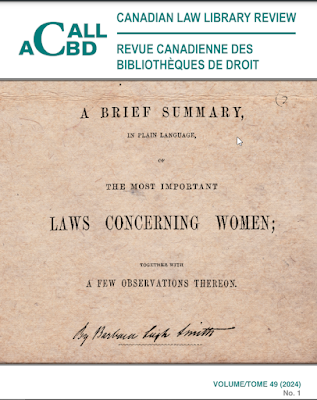Most Recent Issue of the Canadian Law Library Review
The most recent issue of the Canadian Law Library Review (CLLR) is available online.
The CLLR is the official journal of the Canadian Association of Law Libraries (CALL). It is an open access publication.
Check out the feature article:
- The First Law Book for Women: Barbara Leigh Smith Bodichon and A Brief Summary, In Plain Language, of the Most Important Laws Concerning Women (starts on p. 9): "There have been many books written about the legal status of women, but in England, they had all been written by men. That changed in 1854. That year, long before women had equal rights or could practice law, Barbara Leigh Smith Bodichon wrote A Brief Summary, in Plain Language, of the Most Important Laws Concerning Women. This article traces the book’s creation and considers its impact on law reform"
Labels: journals, legal history, library associations, women













